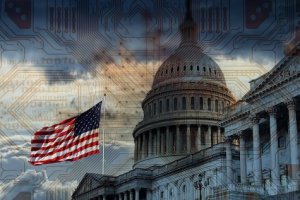Talk about signal and noise: the outpouring of commentary that marked last fall’s tenth anniversary of the Lehman disaster sounded mostly like any other establishment celebration of itself. Current and former policy makers joined with political leaders and prominent bankers to tout how swift, decisive action by central banks and finance ministers had saved the world, while offering reassurance that financial markets were now much safer thanks to reforms overseen by vigilant regulators.
Just as in the run up to the original catastrophe, the press mostly played along. Its stories all but unanimously credited authorities’ claims to heroic status while sidestepping questions about how those same policymakers had allowed the situation to spiral so far out of control in the first place or why “single payer” insurance was OK for the financial sector but not anyone else.
Running in the background, though, was a new, darker theme: That the post-2008 reforms had gone too far in restricting policymakers’ discretion in crises. The trio most responsible for making the post-Lehman bailout revolution—Ben Bernanke, Timothy Geithner, and Henry Paulson—expressed their misgivings in a joint op-ed:
But in its post-crisis reforms, Congress also took away some of the most powerful tools used by the FDIC, the Fed and the Treasury…the FDIC can no longer issue blanket guarantees of bank debt as it did in the crisis, the Fed’s emergency lending powers have been constrained, and the Treasury would not be able to repeat its guarantee of the money market funds. These powers were critical in stopping the 2008 panic…The paradox of any financial crisis is that the policies necessary to stop it are always politically unpopular. But if that unpopularity delays or prevents a strong response, the costs to the economy become greater. We need to make sure that future generations of financial firefighters have the emergency powers they need to prevent the next fire from becoming a conflagration.
Sotto voce fears of this sort go back to the earliest reform discussions. But the question surfaced dramatically in Timothy Geithner’s 2016 Per Jacobsson Lecture, “Are We Safer? The Case for Strengthening the Bagehot Arsenal.” More recently, the Group of Thirty has advanced similar suggestions—not too surprisingly, since Geithner was co-project manager of the report, along with Guillermo Ortiz, the former Governor of the Mexican Central Bank, who introduced the former Treasury Secretary at the Per Jacobson lecture.
Aside from the financial collapse itself, probably nothing has so shaken public confidence in democratic institutions as the wave of bailouts in the aftermath of the collapse. The redistribution of wealth and opportunity that the bailouts wrought surely helped fuel the populist surges that have swept over Europe and the United States in the last decade. The spectacle of policymakers rubber stamping literally unlimited sums for financial institutions while preaching the importance of austerity for everyone else has been unbearable to millions of people.
Especially in money-driven political systems, affording policymakers unlimited discretion also plainly courts serious risks. Put simply, too big to fail banks enjoy a uniquely splendid situation of “heads I win, tails you lose” when they take risks. Scholars whose research INET has supported, notably Edward Kane, have shown how the certainty of government bailouts advantages large financial institutions, directly affecting prices of their bonds and stocks.
For these reasons INET convened a panel at a G20 preparatory meeting in Berlin on “Moral Hazard Issues in Extended Financial Safety Nets.” The Power Point presentations of the three panelists are presented in the order in which they gave them, since the latter ones sometimes comment on Edward Kane’s analysis of the European banks. Kane, who coined the term “zombie bank” and who famously raised early alarms about American savings and loans, analyzed European banks and how regulators, including the U.S. Federal Reserve, backstop them. Peter Bofinger, Professor of International and Monetary Economics at the University of Würzburg and an outgoing member of the German Economic Council, followed with a discussion of how the system has changed since 2008. Helene Schuberth, Head of the Foreign Research Division of the Austrian National Bank, analyzed changes in the global financial governance system since the collapse.
The panel took place as public discussion of a proposed merger between two giant German banks, the Deutsche Bank and Commerzbank, reached fever pitch. The panelists explored issues directly relevant to such fusions, without necessarily agreeing among themselves or with anyone at INET.
But the point Robert Johnson, INET’s President, and I made some years back, amid an earlier wave of talk about using public money to bail out European banks, remains on target:
We are only interested observers of the arm wrestling between the various EU countries over the costs of bank rescues, state expenditures, and such. But we do think there is a clear lesson from the long history of how governments have dealt with bank failures…. [If] the European Union needs to step in to save banks, there is no reason why they have to do it for free… best practice in banking rescues is to save banks, but not bankers. That is, prevent the system from melting down with all the many years of broad economic losses that would bring, but force out those responsible and make sure the public gets paid back for rescuing the financial system.
The simplest way to do that is to have the state take equity in the banks it rescues and write down the equity of bank shareholders in proportion. This can be done in several ways—direct equity as a condition for bailout, requiring warrants that can be exercised later, etc. The key points are for the state to take over the banks, get the bad loans rapidly out of those and into a “bad bank,” and hold the junk for a decent interval so the rest of the market does not crater. When the banks come back to profitability, you can cash in the warrants and sell the stock if you don’t like state ownership. That way the public gets its money back….at times states have even made a profit.
In 2019, another question, alas, is also piercing. In country after country, Social Democratic center-left parties have shrunk, in many instances almost to nothingness. In Germany the SPD gives every sign of following the French Socialist Party into oblivion. Would a government coalition in which the SPD holds the Finance Ministry even consider anything but guaranteeing the public a huge piece of any upside if they rescue two failing institutions?





